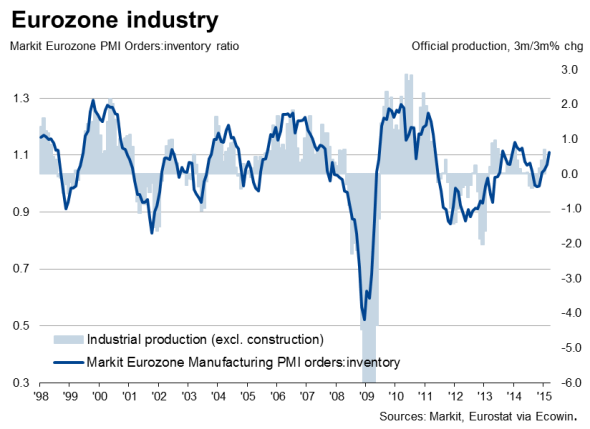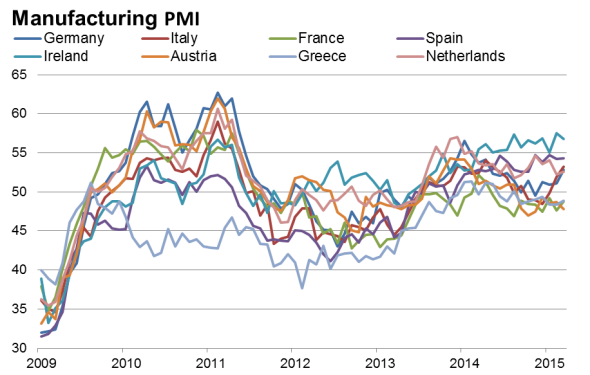Customer Logins
Obtain the data you need to make the most informed decisions by accessing our extensive portfolio of information, analytics, and expertise. Sign in to the product or service center of your choice.
Customer Logins
ECONOMICS COMMENTARY
Apr 01, 2015
Eurozone manufacturing upturn gathers momentum
The final PMI reading signalled slightly stronger growth of the manufacturing economy than the preliminary number, adding further to signs that the eurozone economy is reviving after last year's slowdown.
Stronger growth of demand led to the depletion of inventory levels in March, which suggests companies will boost production in the second quarter. Rising demand also prompted producers to step up their hiring, and also led to some improvement in firms' pricing power.

Orders rise and stock levels fall
At 52.2 in March, up from 51.0 in February, the final seasonally adjusted Eurozone Manufacturing PMI" was above its earlier flash estimate of 51.9. The PMI currently stands at its highest level for ten months and has remained in expansion territory since July 2013.

The ratio of the survey's new orders and post-production inventory indexes, a key indicator of future production trends, also rose. The ratio compares inflows of new business to the amount of finished goods the sector is holding in terms of warehouse stock. The ratio has risen for five successive months to hit an 11-month high, suggesting companies are going to have to raise production to meet demand and prevent warehouse stocks from falling.
While new orders rose at the fastest rate for 11 months, warehouse stocks of finished goods showed the largest fall for two years.
This is still only a fledgling recovery, however. The PMI and the orders:inventory ratio both remain well below historical peaks, signalling that the manufacturing economy is recovering at a modest rate still. Manufacturing remains in decline in France, Greece and Austria, acting as drags on the region's revival.
However, the survey data suggest that the sector clearly has upward momentum which should drive faster expansion in the second quarter.
Euro boost
Producers are benefitting from the weaker euro, which has had the dual effect of boosting competitiveness in export markets as well as making competing imports more expensive in the home markets.
The fact that manufacturers are boosting their payroll numbers at the fastest rate for over three-and-a half years also indicates optimism that the upturn will be sustained in coming months.
Deflationary forces ease
Rising demand is also helping firms and their suppliers to re-establish some pricing power. Factory input prices rose for the first time in seven months and selling prices were broadly stable, providing encouraging news that deflationary forces are easing.
Chris Williamson | Chief Business Economist, IHS Markit
Tel: +44 20 7260 2329
chris.williamson@ihsmarkit.com
{"items" : [
{"name":"share","enabled":true,"desc":"<strong>Share</strong>","mobdesc":"Share","options":[ {"name":"facebook","url":"https://www.facebook.com/sharer.php?u=http%3a%2f%2fwww.spglobal.com%2fmarketintelligence%2fen%2fmi%2fresearch-analysis%2f01042015-economics-eurozone-manufacturing-upturn-gathers-momentum.html","enabled":true},{"name":"twitter","url":"https://twitter.com/intent/tweet?url=http%3a%2f%2fwww.spglobal.com%2fmarketintelligence%2fen%2fmi%2fresearch-analysis%2f01042015-economics-eurozone-manufacturing-upturn-gathers-momentum.html&text=Eurozone+manufacturing+upturn+gathers+momentum","enabled":true},{"name":"linkedin","url":"https://www.linkedin.com/sharing/share-offsite/?url=http%3a%2f%2fwww.spglobal.com%2fmarketintelligence%2fen%2fmi%2fresearch-analysis%2f01042015-economics-eurozone-manufacturing-upturn-gathers-momentum.html","enabled":true},{"name":"email","url":"?subject=Eurozone manufacturing upturn gathers momentum&body=http%3a%2f%2fwww.spglobal.com%2fmarketintelligence%2fen%2fmi%2fresearch-analysis%2f01042015-economics-eurozone-manufacturing-upturn-gathers-momentum.html","enabled":true},{"name":"whatsapp","url":"https://api.whatsapp.com/send?text=Eurozone+manufacturing+upturn+gathers+momentum http%3a%2f%2fwww.spglobal.com%2fmarketintelligence%2fen%2fmi%2fresearch-analysis%2f01042015-economics-eurozone-manufacturing-upturn-gathers-momentum.html","enabled":true}]}, {"name":"rtt","enabled":true,"mobdesc":"Top"}
]}



